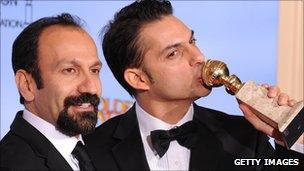Iran web abuzz at Oscar winning film
- Published

Director Asghar Farhadi and actor-screenwriter Peyman Moaad won a Golden Globe
Iranians are not used to seeing their nation portrayed in a positive light. So when the Iranian film, A Separation, was nominated for two Oscars at the 2012 Academy Awards, social media users were quick to leap on the "feel-good factor".
Iranians are acutely aware of the picture of the country abroad, especially in the West. They know that Iran conjures up an image of angry, bearded men storming embassies, human rights abuses and, of course, nuclear proliferation and possible war.
So any recognition internationally, be it in the arts, sciences or sports, creates a sense of excitement and national pride.
Deprived of "good news stories", ordinary Iranians are keen to see that their country's image is not always negative - life and culture go on, despite the economic and political woes.
Success story
The phenomenal success of A Separation, directed by Asghar Farhadi and starring Peyman Moaadi and Leila Hatami, has also offered the opportunity to tweak the tail of the establishment.
The drama is a story of a middle-class couple, Nader and Simin, who live in the capital Tehran and are faced with a dilemma. Simin wants the family to emigrate for the sake of their young daughter. But Nader refuses his wife's wishes because he is looking after his dying father. And so Simin seeks a divorce, which is refused by a clerical judge.
The story resonates with many young and educated Iranians, both at home and among the extensive Iranian diaspora.
A Separation, made with a budget of just $500,000, had already won the Golden Bear for best film at the 2011 Berlin International Film Festival, and this year's Golden Globes Award for the best foreign language film. It also won the BBC Four World Cinema Award in November.
It continued its triumphal progress in 2012, winning best foreign language film at the Cesar Awards in France earlier in February, although it missed out at the Baftas (British Academy of Film and Television Arts).
But it was the nominations for best foreign language film as well as original screen play in the 2012 Academy Awards that attracted increased social media attention.
A Separation was up against, among others, the Israeli film, Footnote by Joseph Cedar, which did not go unnoticed in the Iranian blogosphere.
Withdrawal fears
The sense of national pride was captured by a number of tweets in Persian.
"I hope Nader and Simin wins the Bafta, Cesar and Oscar," wrote Rezasaar82.
Another tweeter did not see the Israeli entry, Footnote, as a serious rival to A Separation.
A couple of bloggers took the opportunity to make a dig at the conservative establishment in Iran.
"The Israeli film Footnote has also been nominated, so I hope we won't pull out [of the Oscars] for the sake of the oppressed people of Palestine," said Half Blood Prince.
Iranian athletes traditionally withdraw from international competitions if they are drawn against Israeli sportsmen, sometimes forfeiting medals.
Melody took up the theme: "I say, imagine that there are some who expect director Asghar Farhadi to give up in this competition, just as athletes are forced to do when facing Israelis."
'Pro-American'
But it was not plain sailing for the film. Pro-establishment figures condemned the film as pro-American.
Iranian film maker Jamal Shurjeh, who is well-known for his movies about the Iran-Iraq war, told the conservative Fars news agency that A Separation had been successful because it "was in line with the policies of US policymakers".
One blogger went as far as saying that the film was made in order to prepare the ground for a US military action against Iran.
"A Separation has been showered with prizes because the foreigners think it will kill hope, the hope of Shia, the hope of those who are loyal to Islam," wrote Hamidreza Alaqehband, ahead of the Oscar.
"All of this is grist to the mill of anti-Iranian propaganda in order to prepare the ground for a US military attack."
BBC Monitoring, externalselects and translates news from radio, television, press, news agencies and the internet from 150 countries in more than 70 languages. It is based in Caversham, UK, and has several bureaux abroad.
- Published27 February 2012
- Published12 February 2012